Even as the state machinery wages war against the Coronavirus outbreak, those suffering from kidney ailments and cancer, hope the government starts prioritising their health too
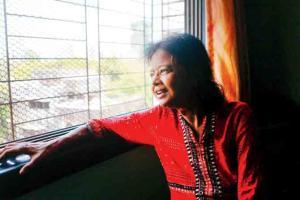
Chitra Dutt, 61, an end stage chronic kidney disease patient, missed two dialysis sessions after Shushrusha Hospital got sealed on April 10. Pic/ Ashish Raje
A month ago, Dipanwita Dutt exchanged vows and moved from Mumbai to Kolkata with her husband. But, leaving her maternal home in Dadar was not easy. Her mother Chitra Dutt, who requires dialysis three times a week, largely depended on her to arrange the doctor visits. But, on the afternoon of April 10, life threw a curveball. A call from Shushrusha Hospital informed them that the 61-year-old's dialysis session, scheduled for the next morning, had been cancelled. "The facility was sealed by the BMC after two nurses tested positive for COVID-19. My father called me, but I had no clue how to help," Dipanwita says. She turned to their nephrologist. "I called Dr Sudhiranjan Dash, who gave us a long list of diagnostic labs where we could test for COVID-19. We were confused. Our priority was different; if my mother, who has end stage chronic kidney disease, misses a single session, she could die." But, it was crucial for Chitra to test negative in order to receive kidney treatment
anywhere else in the city, the doctor emphasised.
ADVERTISEMENT
After a lot of back and forth, with the diagnostic lab cancelling on swab collection appointments, and the family's desperate attempt at seeking help from friends and colleagues, finally on April 13, Chitra got tested. Three days had already been wasted, and another 48 hours were to go to get the results. "Thankfully, the next day we were told via email that my mother had tested negative. But now we had to find an alternative dialysis centre. I made some more calls."
Shushrusha Hospital opened its services on April 15. "After five days and missing two sessions, my mother finally got the treatment on the day the hospital reopened. We were relieved."
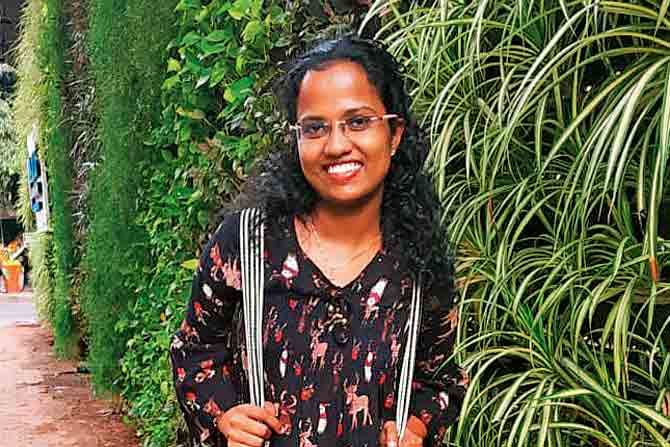
Lima James, who got a rabies shot at a Kandivli centre recently, said the healthcare worker offered her treatment begrudgingly
Much before the Dutts, another family living in Mazagaon had faced the wrath of Coronavirus. Sixty-six-year-old Neil D'souza, who has been undergoing dialysis at Mumbai Central's Wockhardt Hospital for the past one year, had to run from pillar to post when the hospital was sealed on April 5. Neil's 31-year-old son says, "His appointment was scheduled for April 6, 7 am. We received a call the previous night and were referred to Byculla's Masina Hospital. But, we were turned away. It was only after telling the management that we had been referred to their facility and had the necessary letters to prove it, were we allowed in."
While the first session at Masina went smoothly, they hit a roadblock each time they'd step out of the house. "I would take my father on a bike to Masina, which is about two kilometers away from our home. But each time, we were stopped by the police. Despite telling them that ours was a special case, I was asked to do squats on the side of the road as punishment for defying lockdown. This happened five times in a row. I even made a complaint at the Byculla police station." While Masina tried to accommodate additional patients, sessions were getting delayed. "Sometimes, my father's session ended at 2 am."
The duration of the dialysis was also reduced from four hours to three hours. "If this continued for long, the filtration of blood would get reduced by 25 per cent," says the son.
Then, on April 11, Masina was sealed, too. The family called about 15 hospitals and dialysis centres. While a few were sealed, others demanded test results for COVID-19. "Finally, on Easter, my father needed a dialysis urgently and was admitted to JJ Hospital's emergency ward. Two days later, Masina opened again, and we moved him there. It has been chaotic."
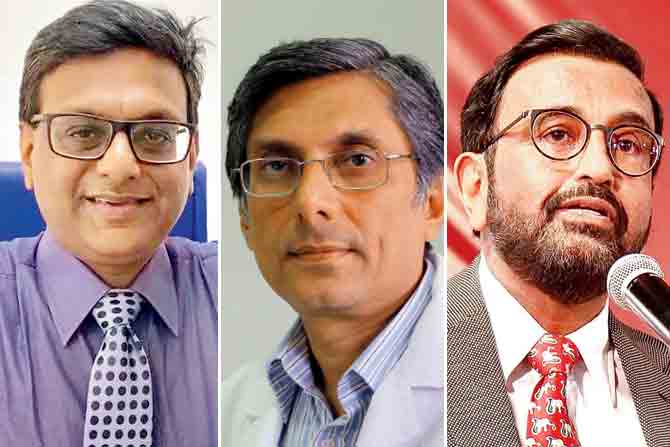
Dr Hemal Shah, Dr Rajiv Sarin and Dr Rajesh Parikh
Mumbai has more than 10,000 kidney failure patients who need dialysis regularly, as per data from the Mumbai Nephrology Group. On the evening of April 16, a committee appointed by the state government overrode the BMC's directives to mandatorily test cancer and kidney patients for COVID-19 before their treatment. The committee now says that the test needs to be done only if necessary.
Samiir Halady of Amar Gandhi Foundation says, "If a person is tested positive in a hospital, the entire facility is shut, including the dialysis centre. This leaves kidney patients in a fix." Halady, who suffered from kidney failure and got a transplant nine months ago, says reaching the hospital amid lockdown is also challenging. The foundation has tied up with Ezy Mov wheelchair taxi services to ferry patients at concessional rates.
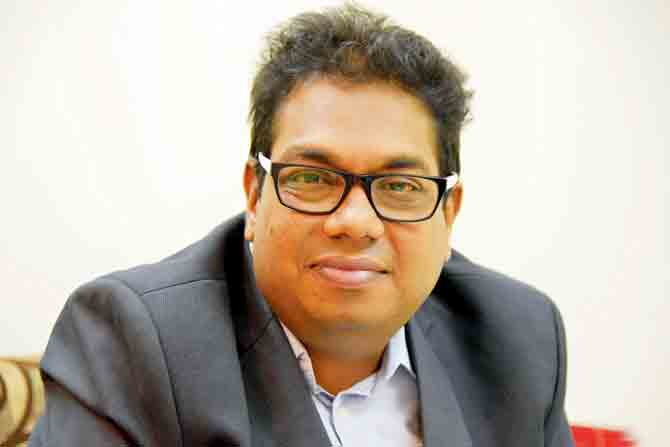
Samiir Halady of Amar Gandhi Foundation
About 15 days ago, the Mumbai Nephrology Group wrote to the BMC, asking it to continue treatment of kidney patients. Dr Hemal Shah, who is part of this group, says, "We referred to international literature on laws for dialysis patients during a pandemic, and came up with a set of guidelines for the BMC to review. People need to understand that doing a test for Coronavirus is not practical for dialysis patients. If you test negative today, there are chances of you being exposed to the infection the next day. So, how is this test even valid?"
Instead, they suggested that all patients and their relatives be screened at the entry point at hospitals. Also, after each shift, surface cleaning be done with hypoclorite solution. And, a suspect case's bed be earmarked in the last shift of the day. "If a kidney patient tests positive, then fumigation should be done and the dialysis unit be shut for 48 hours for sanitisation. Meanwhile, patients need to be informed that the facility will be opened in a few hours, so that they don't panic. Most big centres like Saifee and Bhatia did not shut dialysis centres. The units were cleaned overnight. This needs to be followed across the city."
Bani Das, co-founder of Kranti, a Mumbai-based women's rights non-profit, has been heading to Parel's Tata Memorial Centre (Hospital) since the lockdown was announced. The hospital is a specialised one, so patients from all over the country flock here. Das distributes food, water, and hygiene supplies to caretakers and some discharged patients, who are camping on the footpaths outside the hospital, unable to afford any other accommodation.
"On the first day that I went to distribute meals [April 2], people asked me if I had any water. I didn't. They told me that they wouldn't be able to eat unless, I gave them water. A lot of them hadn't sipped on it for more than a couple of days." She spends roughly Rs 10,000 per day, providing support to anywhere between 160 to 200 squatters. "I take milk for those who can't eat solid food. I also carry bananas for everyone so that their nutritional needs are met," she adds.
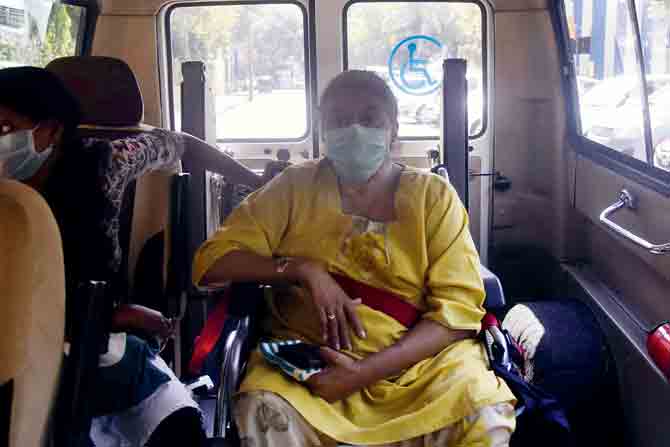
Ezy Mov wheelchair services has forged a tie up with Amar Gandhi Foundation to ferry dialysis patients to the hospital and back at concessional rates when transport isn’t available owing to the lockdown. Pic/ Pradeep Dhivar
The social worker first visited the hospital in 2018 with an aunt from Kolkata, who had arrived in the city for cancer treatment. She realised that after managing to put together funds for subsidised treatment, they had nothing left and were forced to live on the roads outside.
Lalan Malah, who hails from Bihar, is a patient of oral cancer. He arrived in the city accompanied by his 12-year-old son. The duo has been visiting the hospital for the past nine months. He told Das that he was discharged last Friday, but they couldn't head back home owing to the lockdown.
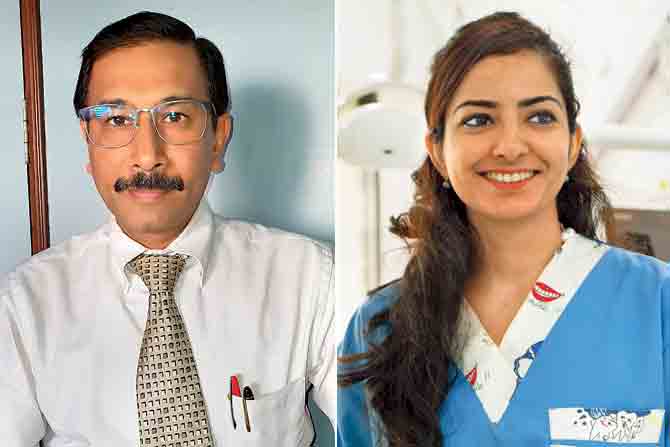
Dr Nilesh Goyal and Dr Varsha Daryanani
Dr Rajiv Sarin, oncologist at the Tata Memorial Centre, says, "These are not emotional decisions. We understand that some treatments need to be delayed in the interest of the patient. Those who are just out of surgery have a low immunity, so chances of them getting infected are higher. We cannot risk it. If we feel that by delaying their procedure by a few weeks we would be increasing the chances of long-term cure, then we go ahead with that decision."
In other cases, where patients are not required to come to the hospital regularly, Tata issues certain guidelines for them to follow. "Patients from Mumbai understand what precautions need to be taken, but most of our cases come from outside the state." Temporary living arrangements were made for the people camping outside the hospital under the Hindmata Flyover. "We have moved them to different locations including the Ahuja Hall in Dadar and the Zaid International Hotel in Marol. A bus service has been started to ferry patients to the hospital," said SH Jafri, senior PRO, Tata Memorial Hospital.
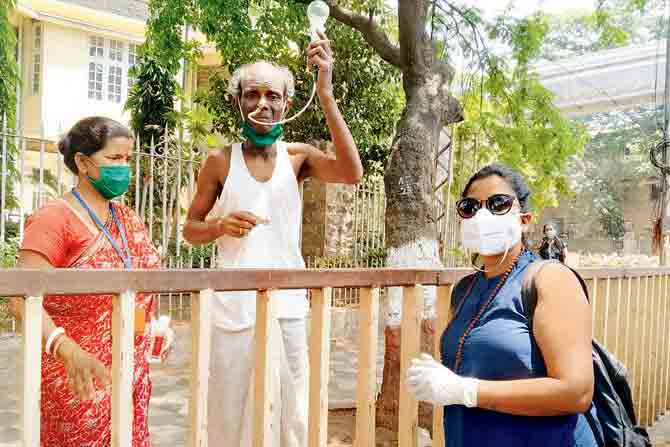
Kranti NGO's Bani with a couple from Kolkata on April 2. The man was discharged from the cancer hospital the day before the lockdown was announced. Since he cannot stomach solids, she hands him a one litre milk packet daily
Some emergency services are also being impacted. Lima James had to head to a municipality hospital near her residence in Kandivli during quarantine. A dog had bit her in March, and she couldn't skip her last shot of the rabies vaccine. The medical officer at the primary care centre, which smelled of disinfectant, gave James the shot she required, but begrudgingly. "She wasn't entertaining most cases unless it was an emergency, from what I could see," said the 24-year-old. Another person who visited the same hospital, said on condition of anonymity that the medical officer wasn't wearing a mask, rather had a dupatta wrapped around her face. "The hospital staff usually signs in my file after making a note of the date in the case papers. But they refused to touch anything non-essential this time," said James. She also had to pay the fees she owed in a novel manner. "I had to put the money in a plastic basket, and had to collect my change from the same basket," she added.
A source from JJ Hospital said that the hospital has separate OPDs for COVID-19 patients. "Professionals working in the fever OPD have been provided with PPE. The junior residents were wearing surgical masks and plastic face shields," says the source. The hospital is treating only emergency cases and those suffering from chronic diseases, such as diabetes and hypertension, to prevent people from gathering in large numbers and reduce the risk of infection. To do this, those patients who don't have troubling symptoms are being advised to consult local clinics and those who can afford to pay for their own medicines are being asked to procure medication from local pharmacies. Strict social distancing is being followed in the hospital, where patients are asked to sit leaving a gap of two chairs between them and the next patient. The OPDs are also regularly sterilised so that they remain hygienic.
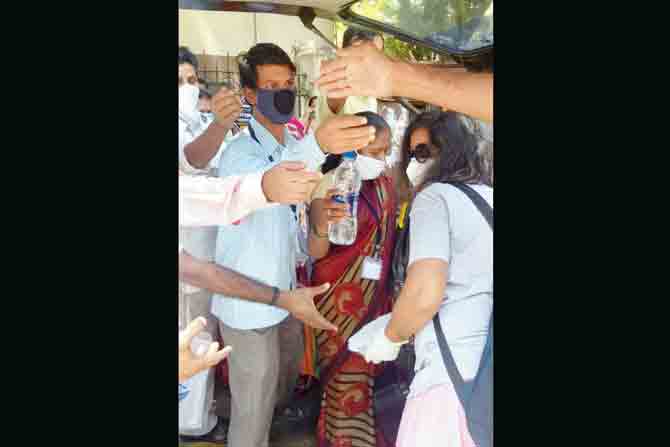
Das has been heading to Tata Memorial Centre in Parel every day, to deliver food and water to relatives and patients camping on the footpaths outside
Dr Nilesh Goyal is a dermatologist who is attached to the Lilavati and Bombay hospitals, apart from running his own clinic in Santacruz. Dr Goyal says that since dermatology is not an essential medical service, all private skin clinics have remained shut during the lockdown, except for those running out of hospitals. He observed that patients themselves prefer online consultations as they are fearful about getting infected at hospitals.
He went down the virtual route four years ago and has been offering medical advice on Google Hangouts since. "Pictures can be deceptive and lead to misdiagnosis. I prefer video calls, where I can see my patients' skin condition and ask them questions about it. Of course, physical touch is an important part of diagnosing someone, and that is missing. But we don't have a choice right now," he explains. His experience has come in handy during the Coronavirus crisis, while more and more doctors follow suit as online consultations have become a viable alternative to personal ones.
"People are going to be hesitant about visiting hospitals even after the virus is contained," he remarks. When an oncologist referred a case to him recently, he was able to rightly recognise the rash on the patient's skin, as a severe one caused by an allergic drug reaction, from the comfort of his home. As a result of his timely intervention, the patient could be treated immediately.
Dr Varsha Daryanani, a dentist who runs her clinic out of Nariman Point, has been using Zoom calls for consultations with her clients. "I have also issued prescriptions virtually, so if someone has a tooth ache, I can provide them some relief instantly." She conducted an online seminar on April 11, for mothers with children between 0 to 12 years, with all the information required to maintain shining dental hygiene.
Dr Rajesh Parikh, a psychiatrist and the director of medical research at Jaslok Hospital, co-authored a book titled The Coronavirus: What You Need to Know about the Global Pandemic (Penguin India). "I was actively following the trajectory of the Coronavirus pandemic and so, towards the end of January, I anticipated a public health crisis," he says. Along with a couple of others, he started drawing up a protocol for their hospital to follow in the month February, while the seriousness of the crisis began to slowly dawn on the rest of the city. "We readied the 12th floor for COVID-19 patients. We did some dry runs. We were prepared in the first week of March when there were about 80 cases in the country, much before a single patient came to us to get tested for the viral disease," he adds.
When the hospital's staff was tested as a part of the protocol, some doctors and nurses who were asymptomatic tested positive for COVID-19. They were immediately quarantined and the hospital underwent a partial shutdown. "Patients who didn't really need to be there and those who were particularly vulnerable due to their age or pre-existing health conditions were moved back to their homes or other hospitals. Others who needed our care were retained," he explains. The hospital was fumigated and their protocol was fine-tuned. Currently, Jaslok is on course to function at full capacity.
"I developed some symptoms three weeks ago and I went into self-quarantine. I got tested after a week with my family. Luckily, all of us tested negative," says Dr Parikh. Although he admits that the online solution is not a feasible one for cases where physical examination of the patient is crucial, he has been seeing his patients online, via LogintoHealth, a health app that his hospital has partnered with. He has also been consulting over the phone. "As psychiatrists, we need to examine the patients too. But what I have been doing is coordinating with local doctors. For instance, I suggest that a patient go to a local GP and get their blood pressure checked. I spoke to a new patient and the family over the phone recently, after going through the case history. We were able to successfully initiate treatment," he concludes.
Some names have been changed/withheld on request [email protected]
Catch up on all the latest Mumbai news, crime news, current affairs, and a complete guide from food to things to do and events across Mumbai. Also download the new mid-day Android and iOS apps to get latest updates.
Mid-Day is now on Telegram. Click here to join our channel (@middayinfomedialtd) and stay updated with the latest news
 Subscribe today by clicking the link and stay updated with the latest news!" Click here!
Subscribe today by clicking the link and stay updated with the latest news!" Click here!






